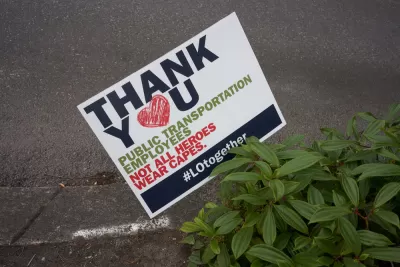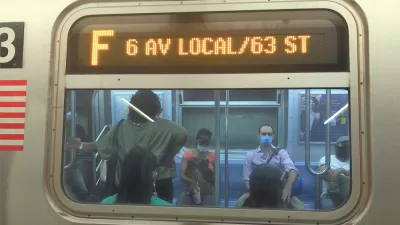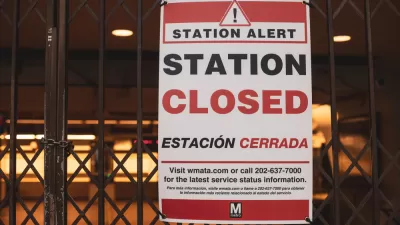Riders who rely most on public transit are suffering the worst consequences of the cuts to service during the fiscal belt tightening of the coronavirus pandemic.

Pranshu Verma reports on the state of public transit service around the country as the fiscal and ridership fallout from the pandemic deepens:
Public transit leaders across the country have issued dire warnings to Congress, saying that the first $25 billion in aid they received in March is quickly drying up, and they need more — otherwise their systems will go into a “death spiral.”
As public transit agencies feel the pain of declining revenues from fare payments as well as the other sources of funding, like sales taxes, for example, it's the most vulnerable users who are suffering the most, according to Verma.
But as service cuts to the United States’ bus, rail and subway systems start to happen, experts say it is the nation’s low-income residents, people of color and essential workers bearing the brunt. Many of them feel the congressional gridlock is completely ignoring their plight.
The article includes anecdotes from New Orleans about the plight of residents who depend on public transit to access essential services like grocery stores and medical care, but residents of cities all over the country are experiencing similar consequences.
Meanwhile, according to Verma, the U.S. Senate seems intent not to pass a stimulus package that would provide further funding to transit agencies around the country. The U.S. House of Representatives approved the HEROES Act in May, although transit advocates have criticized that bill, as well as the predecessor CARES Act, for spending too much on car-centric projects and reinforcing the funding status quo.
FULL STORY: ‘We’re Desperate’: Transit Cuts Felt Deepest in Low-Income Areas

Alabama: Trump Terminates Settlements for Black Communities Harmed By Raw Sewage
Trump deemed the landmark civil rights agreement “illegal DEI and environmental justice policy.”

Study: Maui’s Plan to Convert Vacation Rentals to Long-Term Housing Could Cause Nearly $1 Billion Economic Loss
The plan would reduce visitor accommodation by 25% resulting in 1,900 jobs lost.

Planetizen Federal Action Tracker
A weekly monitor of how Trump’s orders and actions are impacting planners and planning in America.

Wind Energy on the Rise Despite Federal Policy Reversal
The Trump administration is revoking federal support for renewable energy, but demand for new projects continues unabated.

Passengers Flock to Caltrain After Electrification
The new electric trains are running faster and more reliably, leading to strong ridership growth on the Bay Area rail system.

Texas Churches Rally Behind ‘Yes in God’s Back Yard’ Legislation
Religious leaders want the state to reduce zoning regulations to streamline leasing church-owned land to housing developers.
Urban Design for Planners 1: Software Tools
This six-course series explores essential urban design concepts using open source software and equips planners with the tools they need to participate fully in the urban design process.
Planning for Universal Design
Learn the tools for implementing Universal Design in planning regulations.
Caltrans
Smith Gee Studio
Institute for Housing and Urban Development Studies (IHS)
City of Grandview
Harvard GSD Executive Education
Toledo-Lucas County Plan Commissions
Salt Lake City
NYU Wagner Graduate School of Public Service




























